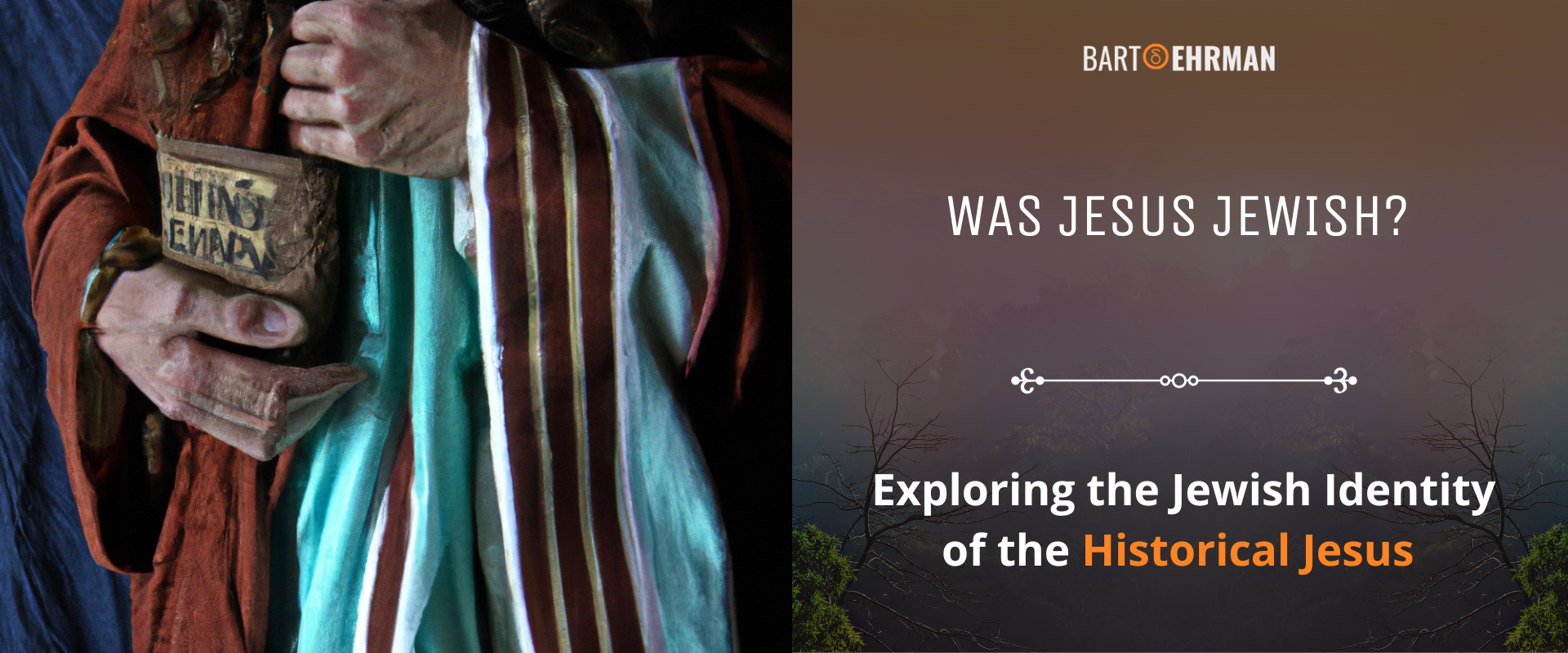Was Jesus Jewish? Examining His Religion and Heritage

Written by Marko Marina, Ph.D.
Author | Historian
Author | Historian | BE Contributor
Verified! See our guidelines
Verified! See our editorial guidelines
Date written: October 16th, 2023
Disclaimer: The views and opinions expressed in this article belong to the author and do not necessarily match my own. - Dr. Bart D. Ehrman
In the heart of the ancient Mediterranean world, among diverse cultures and religions, one enigmatic figure emerged over two thousand years ago – Jesus of Nazareth. While his teachings and legacy have left an indelible mark on human history, one question still resonates through the ages: Was Jesus Jewish?
Delving into this question means taking a voyage back in time, deep into the intricacies of ancient Judaism. Brace yourself as we uncover the layers of history, beliefs, and social dynamics that unveil Jesus as a Jew from the 1st century.

Ancient Judaism: Key Terms and Concepts
What did it mean to be a Jew in the ancient world? The answer lies in both geography and religion. The term “Jew” or “Jewish” originally referred to someone of Judean origin, someone whose family came from the district of Judah. In essence, the district of Judah was a geographical area centering on the city of Jerusalem.
Moreover, every city or Kingdom in antiquity had a special patron deity. Perhaps the most famous example would be Athena - the patron goddess of Athens. Similarly, the God of Israel was the patron deity of the Jews.
A Jew in Jesus’ time was, therefore, someone of Judean descent (geographical notion) who worshiped the God of Israel as his patron deity (religious dimension). Jews were also known for their emphasis on the special (written) Law that God gave them. In other words, Judaism was a “bookish” religion with the special Canon of Scripture!
Furthermore, Jewish religious identity was centered around the Temple in Jerusalem. Solomon built the first Temple around 960 B.C.E. But the Babylonians razed it to the ground in 586 B.C.E. Then, the second temple was consecrated in 516 B.C.E. and rebuilt by Herod the Great at the end of the 1st century B.C.E. However, the Romans destroyed it in 70 C.E.
To comprehend Jesus’ Jewish identity, we need to compare and contrast Judaism with other ancient religions. Older generations of historians were inclined to set ancient Judaism apart from other religious systems emphasizing only its distinctive features.
However, modern scholarship looks at Jewish religion within the context of the ancient Mediterranean world. It is important, therefore, to see how ancient Judaism was both similar and different from other religions.
The Judaism of Jesus vs. Ancient Religions in the Mediterranean World
The biggest similarity was the temple. Ancient people almost universally believed that the temples were houses of the deities. In other words, temples were places where deities dwelt.
The needs of God in the Jerusalem Temple were serviced by priests who offered sacrifices on an altar located outside of the Temple building. This is also a common feature in other ancient Mediterranean religions.
However, there were some important differences between Judaism and other religions:
Despite the “Principle of one Temple”, there were other ancient temples dedicated to the God of Israel and located outside of Jerusalem. It seems that religion has always provided a solid ground for practicing disobedience!
Jesus as a Jew: A Brief Look at the Sources
Despite their historical problems, canonical Gospels are our best sources for Jesus’ life. In unison, they portray Jesus as a Jew. Looking at this issue from a broad perspective, several key things are worth mentioning:
To put it differently, Jesus was born, lived, and died as a Jewish individual. The Gospels, though composed several decades after his death when Christianity was gradually distinguishing itself from Judaism, do not present any evidence to the contrary.
Jesus, Christianity, and Judaism
But, wait a minute! If Jesus was a founder of Christianity, does that mean he was a Christian? It doesn’t. The key point to understand here is that Christianity is not the religion of Jesus. It’s a religion about Jesus.
Jesus' religion was Judaism. His disciples were also Jews. But the roots of the new religion began to sprout after Jesus' death when his disciples started to claim that God resurrected him! With the belief in Jesus’ resurrection, a shift in history occurred.
It took decades after Jesus’ death for Christianity to separate itself from Judaism. But it would never happen without the initial belief in Jesus’ resurrection.
What is then the difference between Christianity and Judaism? There are many but the most obvious is the resurrection. Jews never accepted the belief that God raised Jesus from the dead. Similarly, they rejected Jesus’ Messianic identity.
For Jews, the idea of a crucified Messiah was beyond reason. As apostle Paul states: “But we preach Christ crucified: a stumbling block to Jews (1 Cor. 1:23).”
Critical scholars believe that by the end of the 1st century C.E., most Christians were Gentiles, not Jews. Consequently, the so-called “parting of the ways” between Christianity and Judaism clouded Jesus’ Jewish identity.
Did You Know?
While Jesus was a Jew, many scholars would not consider him to be a “Hebrew.” Hebrew people, historically, were the descendants of the biblical patriarch Abraham, of whom Jesus certainly was a descendant. However, the term "Hebrew" is often used in reference to the ancient Israelites, the people of the biblical Old Testament.
So, Jesus was a Jew and we can reveal his Jewish identity by looking at the three key elements of his life:
FREE COURSE!
WHY I AM NOT A CHRISTIAN
Raw, honest, and enlightening. Bart's story of why he deconverted from the Christian faith.
Over 6,000 enrolled!
Genealogies of Jesus and the Jewish Descent
A lot of Jews in the time of Jesus expected the coming of the Messiah. But they weren’t sure exactly what kind of Messiah would come. These messianic figures were typically eschatological redeemers, who would come at the end of days, sent by God to reign over a restored Kingdom of Israel. The restored Kingdom was often associated with the great Jewish King David (2 Sam. 7:1-29).
In the famous genealogies of Jesus (Mt 1:17; Lk 3:23-38), one can reveal the importance of Jesus’ Jewish identity. The assumption that Jesus must be descended from David to be the legitimate messiah, underlies the birth narratives in Matthew and Luke.
In other words, the Gospel writers went to great lengths to establish Jesus’s descent from David. Not because it was a historical fact but because they believed that in order to be the legitimate messiah, Jesus must be descended from David.
What Jewish tribe was Jesus from? According to Matthew and Luke, Jesus was believed to be from the tribe of Judah. It was traditionally expected that the Messiah would be a descendant of David from the tribe of Judah, which is why Jesus is often referred to as the "Son of David" in the New Testament (Mt 15:22; 20:30).
I’m not arguing that the infancy narratives are historically reliable. Most critical scholars don’t even think that Jesus was born in Bethlehem! My point is that the emphasis on Jesus’ relation to King David reveals another aspect of Jesus’ Jewish identity.
Jesus was a Jew. If not, Matthew and Luke wouldn’t tried so hard to connect him with the concept of a Jewish Messiah and the descendant of David.
To do that, they, among other things, utilized typological motifs from the Old Testament. In the Gospel of Luke, Jesus is a great prophet (like Elijah) of the Davidic line. For the author of Matthew’s Gospel, Jesus was also a prophet and descendant of David but more like Moses.
But typology, as Anthony Le Donne observes in The Historical Jesus, “is not just a literary device but a strategy of memory.” In other words, evangelists could utilize Old Testament typology precisely because Jesus came from a Jewish background.
Jesus’ Core Message: Jewish Apocalypticism
Jesus’ worldview is widely characterized as apocalyptic and eschatological. These are Jewish terms that depict a particular ideology popular among the 1st-century Jews. If you want to find out more about Jewish apocalypticism, click here!
In Jesus: Apocalyptic Prophet of the New Millennium Dr. Ehrman explains: “Jesus stood within a long line of Jewish prophets who understood that God was soon going to intervene in this world, overthrow the forces of evil that ran it, and bring in a new kingdom in which there would be no more war, disease, catastrophe, despair, hatred, sin, or death. And Jesus maintained that this new kingdom was coming soon, that in fact, his generation would see it.”
This is a profoundly Jewish message. Was Jesus a Jew? His preachings and public ministry strongly suggest it!
Did You Know?
During the Third Reich, German Protestant theologians, motivated by racism and tapping into traditional Christian anti-Semitism, redefined Jesus as an Aryan and Christianity as a religion at war with Judaism. They found an ally in a British-German philosopher H. S. Chamberlain.
Chamberlain’s book “The Foundations of the Nineteenth Century” reached its 29th German edition in 1944. Basing his “arguments” on racist principles, Chamberlain concluded that “Jesus had not a drop of genuinely Jewish blood in his veins.”

Jesus’ Death on the Cross: A Sign of His Jewish Identity
I vividly recall my first lecture in the 'Introduction to Koine Greek' class, a moment that unexpectedly led us into the realm of the Historical Jesus. Our professor, in a captivating digression, asserted that the only historical certainty we possess about Jesus is his crucifixion. An eerie silence fell over the room as we all absorbed the weight of those words.
Looking back on that moment, it's apparent that our professor may have employed a touch of dramatic flair to make his point. However, his statement underscores a profound truth - Jesus' crucifixion on the cross is an undeniable marker of his Jewish identity.
The New Testament Gospels (Mk 15:26; Mt 22:37; Lk 23:38; Jn 19:19) insist that Jesus was tried for claiming to be the “King of the Jews”. This was the statement of the crime which hung above the cross. “Clearly Pilate,” Helen Bond writes, “regarded Jesus as a political agitator with some kind of messianic pretensions.”
The messianic pretensions that got Jesus crucified are of Jewish origins. In other words, they can’t be understood outside of the Hebrew tradition. Jesus was Jewish and his trial and execution prove it!
Summing up Conclusion: Jesus was a Jew
As we conclude our exploration into the Jewish identity of the historical Jesus, it becomes abundantly clear that he was, undeniably, a product of his Jewish heritage.
From the genealogical ties to King David and the profound resonance of his teachings with Jewish prophetic tradition to his death on the cross, Jesus was firmly rooted in the traditions and beliefs of 1st-century Judaism.
Based on his life, death, and resurrection, a new religion emerged. A religion that centered around his life. But Christianity was never the religion of Jesus because Jesus was a Jew! To contrast the infamous words of H.S. Chamberlain: Only Jewish blood flowed in Jesus' veins.
If you want to know more about the origins of Christianity, I invite you to join Dr. Ehrman’s captivating course “Jesus the Secret Messiah”. As a renowned scholar of early Christianity, Dr. Ehrman provides a critical lens through which modern historians look at the earliest Christian Gospel! Click the link below!
FREE COURSE!
WHY I AM NOT A CHRISTIAN
Raw, honest, and enlightening. Bart's story of why he deconverted from the Christian faith.
Over 6,000 enrolled!
